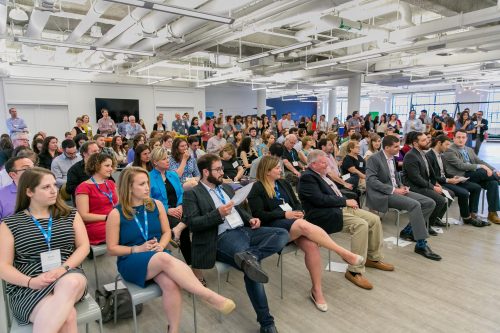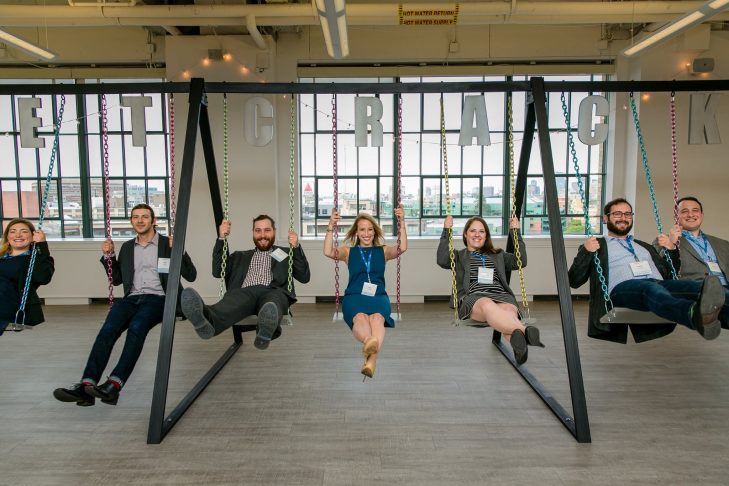Tuesday night a community of innovators, entrepreneurs, activists and thinkers came together to hear from the 2015-2016 cohort of PresenTense Boston fellows. Boston is among 15 cities across the United States and Israel that is part of a network of venture accelerators in which social innovators pursue business ideas that are a priority for their Jewish communities. In Boston, the program is under the auspices of Combined Jewish Philanthropies’ initiative for young adults.
The Boston group of three women and four men participated in a 10-month intensive program, during which they realized their visions of social entrepreneurship with volunteer mentors and coaches. Their projects touched on a number of vital issues, including outreach to interfaith couples, individuals and families, adult Jewish learning, responsibility to people with disabilities and bringing Jewish joy and celebration to unaffiliated Jews. Fellows presented their new businesses in a dynamic social innovation showcase at Hatch Fenway in Boston’s Landmark Center.
PresenTense Boston co-chairs Adam Eisenberg and Dena Kowaloff were on hand to introduce the program. “It’s amazing to see the transformation that happens in 10 months,” Kowaloff told JewishBoston. “Ideas just pop!”
Ohad Elhelo keynoted the evening, and CJP president Barry Shrage closed the program. The Israeli-born Elhelo is the energetic founder of Our Generation Speaks (OGS), a three-year-old leadership program and innovative incubator in its own right. Over the summer Elhelo brings together 22 Israelis and Palestinians for a fully funded residency at Brandeis University’s Heller School for Social Policy and Management. The goal is clear-cut: to cultivate relationships between the Israelis and Palestinians—relationships that carry over to building startups and non-profits in fields that include agriculture, health, and women’s empowerment through technology. “At OGS, we bridge gaps for underserved populations,” Elhelo said. “And we build trust with people who have the ability to interact and cooperate with each other.”
Elhelo’s remarks were a natural segue into the showcase, where, in quick succession, the fellows presented dynamic and compelling examples of social entrepreneurship. Bryanne Mahoney pitched “Share & Tell,” a deck of cards intended to jumpstart conversations between interfaith couples and families. Mahoney speaks from experience as a child of an interfaith family and as part of an interfaith couple. The cards vary in tone. Some are fun, such as, “When did you realize your parents were human and made mistakes?” Others tackle deeper questions, such as, “Tell me one thing you found meaningful from a wedding or ceremony you attended.” Mahoney told JewishBoston that the cards are intended to be “an easy way to start a conversation about values.”
Interfaith issues are also close to Alexis Gewertz’s heart. She aims to make an impression in the flourishing greeting-card business with “Happy Challadays,” cards for interfaith couples and families. “It’s a way to help interfaith families be a part of every celebration, whether it’s the December dilemma or the Easter/Passover pickle,” Gewertz explained. “It’s carving a space for them on the shelves.”
Ben Elgart is determined to empower young adults with social and cognitive disabilities with an app called “Buddybot.” In the course of his research, Elgart realized that young adults in the disability community could become socially isolated when transitioning from educational programs to the real world. “The app helps these young adults connect with friends and family,” he said. “It kick-starts conversations and keeps them flowing. It allows users to take ownership of their social lives.”
Taking ownership is a theme that drives Getzel Davis and Julie Judson’s businesses. Davis, a rabbi at Harvard Hillel, offers a web-based service called “UnOrthodox Celebrations,” which connects unaffiliated Jews across North America with officiants who will perform lifecycle events for them. Davis has amassed over 300 rabbis and cantors in his database. “Weddings are a joyous occasion,” he said. “Finding an officiant shouldn’t be joyless.”

In her day job as a fundraiser for the Wang Theatre, Judson noticed that her fellow millennials contributed to a variety of charities in small increments. That phenomenon inspired her to come up with “NextGenerosity,” an app to keep track of varied giving and the impact it has. “NextGenerosity plants the seeds of our philanthropy now,” Judson said, “so we can grow these seeds for the future.”
Andy Pankin and Mark Rudnick have a stake in the Jewish future with their educational online venture, “Naor Learning.” Naor, the Hebrew word for “enlightened,” enables anyone with an Internet connection to learn with outstanding educators and Jewish organizations. Pankin and Rudnick, graduates of Boston’s Jewish day schools, see Naor Learning as “an opportunity to engage the unaffiliated. We were inspired by our Jewish education and want to offer the same enriching education to others.”
In his concluding observations, Shrage asserted that: “If we ignore the need for outreach to young adults who have just come back from a [Birthright trip], or ignore the opportunities to reach out to interfaith families or teach young adults how to do [charity], we lose those opportunities. And look at you. How can we afford to lose you? It would be a crime against Jewish history.”
This post has been contributed by a third party. The opinions, facts and any media content are presented solely by the author, and JewishBoston assumes no responsibility for them. Want to add your voice to the conversation? Publish your own post here. MORE



